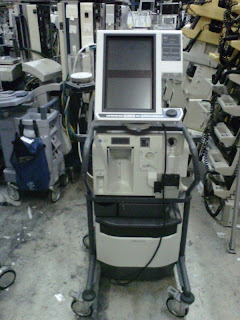There seems to be a misunderstanding about hospitalization. There is more to being in the hospital than just being "sick." That is the one detail I feel that people forget. It may just be because I'm there all of the time but when someone says hospital, most people associate it with sickness. Now that is quite a normal and expected response but how about you consider the whole person there. I feel that this perspective will be more successfully conveyed through show vs. tell (as it is only my personal take).
It's an average Saturday visiting Jacob in the Pediatric Intensive Care Unit. Walking through those double doors on the way to Jacob's room I walked by the other patients rooms. Some were conscious and others not. You always hear an array of noises; alarms from ventilators, the call button from frazzled and worried parents, or the dreaded "code blue" call. Luckily, I was rarely around when that occurred. Walking into Jacob's room you see his mechanical ventilator, about 4.5 feet tall one side of his bed with a long blue tube attached, wound around the bars of his crib. On his chest there are red, gray, and blue wires that connect to the monitor next his vent. The top number measured his oxygen saturation which I anxiously watched hoping it wouldn't drop below 92.You can hear every breath that the machine forces in and out of his chest; the rise and fall all orchestrated by a machine.
Most of the time, Jacob was in isolation for multiple reasons. He rarely saw our actual faces, we were required to wear gloves, a yellow gown, and a face mask. All he could see were our eyes; there really is truth to smiling with your eyes. Those 2 and a half years he was in the hospital was definitely the most difficult two years of my life. I cried every night, some days were better than others but for the most part every day was a roller coaster. It is no different from now but I suppose at the time I just wasn't used to living on edge every day. The night before his second birthday he went into cardiac arrest. The hospital performed CPR on him for 30 minutes and were not hopeful they would be able to bring him back. It's difficult for me to write this even now. I cannot express in words how difficult this is. Jacob knows when he can't breathe and he cries because he's obviously scared. He's not numb to going out of consciousness, he feels everything. Some of you don't know what it feels like to pass out from a lack of oxygen so I'll do my best to describe it to you. At first your chest gets tight and you feel your throat closing (it's your bronchial tubes narrowing). Where some people can cough the extra mucus up Jacob isn't strong enough to have what they call a productive cough. For this reason, you always have to be aware of his oxygen sats. Once they drop and he sounds what we call "junky" (in better terms congested) you suction him. This is nothing more than sticking a plastic tube down his trac, attached to a machine full of air that sucks those secretions out. Nowadays because we found that suction machine to be damaging his tracheal lining we use the coughesist. This machine is used in people with cystic fibrosis. It forces air in and sucks air out which essentially takes the place of the cough he doesn't have. When I go out of consciousness my body reacts differently than his. Since he is a spinal cord injury, he cannot regulate his body temperature. So when he gets in trouble it is a whole body affect. I may not be able to breathe but all my other vitals are stable. When he has a problem breathing and he knows it, he has a high chance of going into anaphylactic shock. His blood pressure and heart rate can sky rocket while his oxygen saturation plumets. This is why it's critical to make sure he doesn't drown in his own secretions; I'm still on the physical sickness part, I haven't even touched the emotional affects yet......on everyone. That will be a new entry. This is long enough for one and it starts the beginning of this whole journey. Not only that but the reason behind why I always choose to write about children's rights and the importance of quality of life; why my passion and career path revolve around fighting for these children's rights.

No comments:
Post a Comment